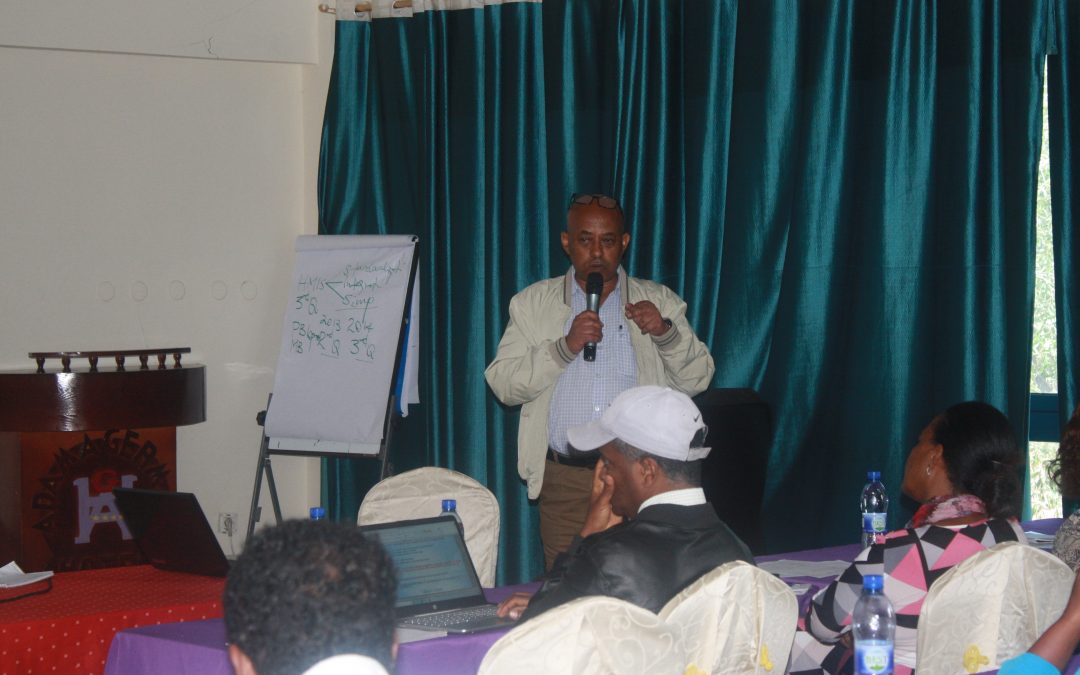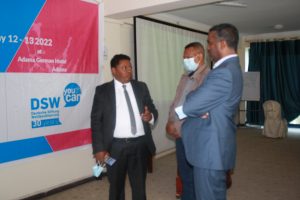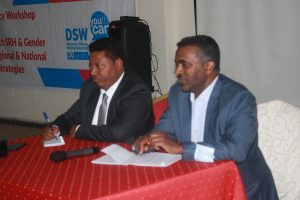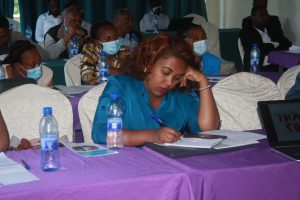DSW Ethiopia is triumphing in an environment that was not very open to NGO engagement until recent years, by hosting and engaging in a series of advocacy activities. Two high profile advocacy workshops took place on 12 and 13 May 2022 during which a regional advocacy workshop brought together thirty-seven government stakeholders and media organisations at Adama German Hotel in Adama (Nazareth).
The busy schedule of the two-day workshop included various activities with topics such as the integration of youth sexual and reproductive health (SRH) and gender issues from regional and national policies and strategic perspectives. Government stakeholders and other partners representing civil society organisations interacted in the panel discussion after power point presentations offered the contexts in which the entire discourses were shaped. The project entitled “Healthy Youth at Work”, with advocacy being one of its core strategies, was presented as a success story. This project supports youth from seven flower farms and eighteen other factories.
“The ability to report a success story doesn’t come by quick and in an isolated effort,” underscores Lelise Melaku, Youth & Adolescent Reproductive Health Officer with Oromia Bureau of Health (BoH) during her presentation, adding “it requires good planning and strong partnership with the key stakeholders. More so, by identifying the needs and tailoring the right strategy to address them.” Lelise further emphasized that “we observed the cascading effects on unintended pregnancy that leads to unsafe abortion would have negatively impacted the preexisting problematic situation in which youth at the workplace were vulnerable before this project was launched.”
“Our modality for intervention embraced an assessment of the needs based on the empirical evidence drawn from a pilot project on a phase by phase approach. We integrate compatible issues for comprehensive outcomes. That is why this workshop is set to advocate the importance of intervention on the sexual & reproductive health & rights (SRHR) of youth at the workplace through integrating youth SRHR and gender issues into regional and national policy and strategies,” affirms Feyera Assefa, Country Director of DSW Ethiopia.
“Since its inception, this project has been on course with success and settles into its second phase already impacting on sustainable outcomes as the government stakeholders have scaled up the practices. This is an encouraging achievement on the part of DSW to keep maintaining its strategic partnership through such integrated intervention that reinforces development issues into regional and national policy and strategies,” says Tesfaye Hailu, Deputy Head of Planning & Economic Development Commission (PEDC) of the Oromia Regional State.
Encouraged by the degree of commitments coming from those with stakes attending the workshop, Feyera recognizes how DSW’s advocacy efforts came a long way in mobilizing a strong sense of ownership of the project and the strategic partnership with government stakeholders that kept growing, including with the PEDC and BoH, as well as other sector offices in Oromia region. “We remain committed and continue to reach out to the youth as target groups of the project by developing their capacities and creating an enabling environment for them to advocate on SRHR issues at local, national and international levels,” reassures Feyera.
As DSW triumphs through advocating its integrated modality for project intervention, it expanded the strategic partnership with multi-sectoral institutions to ensure sustainable outcomes. “Healthy Youth at Work” is a three-year project phased in as an extension of the successful pilot intervention undertaken before it. The project has been financially and technically supported by the David & Lucile Packard Foundation from the onset of the earlier pilot phase that lasted three years right through to the second phase, which is still running. Since then, DSW has taken lessons from this workplace intervention and expanded its experience to industrial parks, where a large number of youths are employed, with support from the government.
Photos: private




